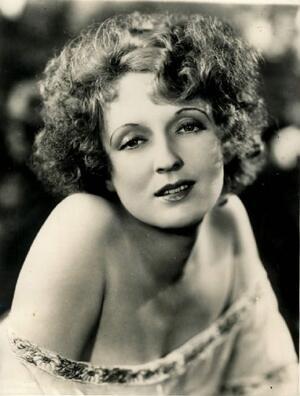Carmel Myers dies: movie vamp and Hollywood A-List hostess
In 1916, Rabbi Isadore Myers worked as an unpaid consultant for legendary film director D. W. Griffith on his groundbreaking epic Intolerance. When Griffith asked, “How can I ever repay you?” the rabbi answered, “I have a daughter who would like to get into pictures.” Carmel Myers, then 17, became a contract player paid $14 a week.
She would go on to act in over 70 films in 60 years, including playing Iras, the wicked Egyptian seductress in the 1926 silent film version of Ben Hur. Her film work ranged from romantic comedies with John Barrymore and Rudolph Valentino to those with titles like The Haunted Pajamas and Won Ton Ton, the Dog Who Saved Hollywood. Looking at the publicity photos and glamorous fashions of this Hollywood legend, the attraction the camera had for her is palpable. Acrobatic, innocent, playful, seductive – she could be an icon for any mood. But she later told friends that she preferred to play wicked women because “the nice ladies are just like wallpaper.” She was honored in 1960 with a star on the Hollywood Walk of Fame.
In the house formerly owned by Gloria Swanson, another screen siren, she gave dinner parties for 300 stars from Hollywood’s A-list. In fact, Myers coined the term “A-lists” and “B-lists” for her own parties. She romped with Zelda and F. Scott Fitzgerald in Rome and Hollywood, and she held court from her Park Avenue apartment on The Carmel Meyers Show, one of the first TV talk shows in 1951.
But a publisher reportedly rejected her memoirs because there was no scandal in her life. Carmel Myers and Ralph H. Blum married in 1929 and had three children: writer and cultural anthropologist Ralph H. Blum and two adopted daughters, actress Susan Adams Kennedy and television producer Mary Cossette. Widowed in 1950, she married film executive Alfred W. Schwalberg in 1951. She was widowed for the second time in 1974.
The ability to remake herself--along with her dedicated work ethic--were the secrets of her success. When her film opportunities dried up, she performed twice a day in vaudeville at the Palace Theatre, wrote both short fiction and a self-help book called Don’t Think About It, and appeared in dozens of television commercials. She held a patent for an electronic synchronizer that controlled studio lights and worked in the Los Angeles real estate business. And the day before she died, she appeared at the high-fashion I. Magnin luxury department store to endorse her line of imported French perfumes.
One of her favorite anecdotes of her early career involved movie magnate Samuel Goldwyn. She recalled that Goldwyn (whose real name was Goldfish) once offered her work on the condition that she change her name because it sounded "too Jewish."
"Oh, Mr. Goldfish," she remembered telling him, "If my career depends upon hiding the fact that I was born a Jew, I'd rather not have one."
Sources: “Carmel Myers, Silent Movie Star Who Played Wicked Women, 80”, New York Times, November 19, 1980; “Carmel Myers: The Rabbi’s Beautiful Daughter,” Seraphic Secret.



